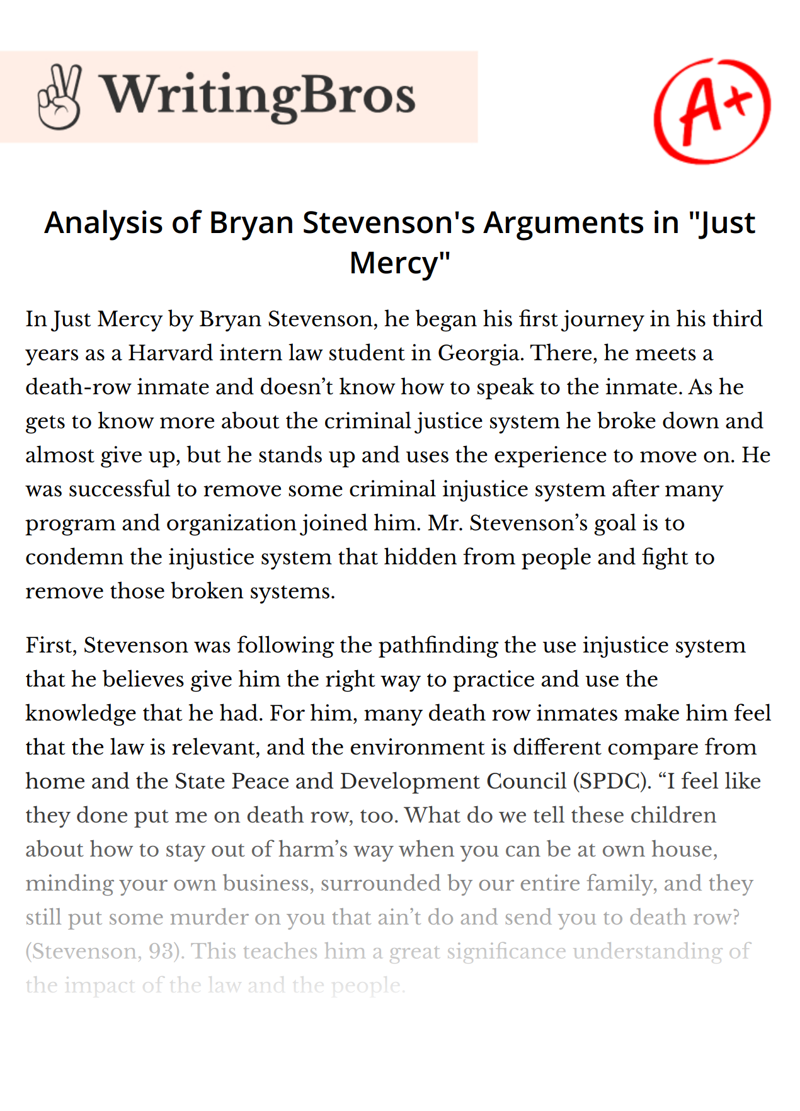Analysis of Bryan Stevenson's Arguments in "Just Mercy"

In Just Mercy by Bryan Stevenson, he began his first journey in his third years as a Harvard intern law student in Georgia. There, he meets a death-row inmate and doesn’t know how to speak to the inmate. As he gets to know more about the criminal justice system he broke down and almost give up, but he stands up and uses the experience to move on. He was successful to remove some criminal injustice system after many program and organization joined him. Mr. Stevenson’s goal is to condemn the injustice system that hidden from people and fight to remove those broken systems.
First, Stevenson was following the pathfinding the use injustice system that he believes give him the right way to practice and use the knowledge that he had. For him, many death row inmates make him feel that the law is relevant, and the environment is different compare from home and the State Peace and Development Council (SPDC). “I feel like they done put me on death row, too. What do we tell these children about how to stay out of harm’s way when you can be at own house, minding your own business, surrounded by our entire family, and they still put some murder on you that ain’t do and send you to death row? (Stevenson, 93). This teaches him a great significance understanding of the impact of the law and the people.
On the other hand, he has never been incarcerated, but he saw many injustices run down his family. By understanding the impact of slavery and segregation, he argues it’s important to know historical forces when trying to correct the injustice system. “They treated us like we were low-class white trash. They could not have cared less about us […] I thought they treated victims better. I thought we had some say” (Stevenson, 140). To get closer to condemned, had to counter hit it when a most well-known case in the criminal justice system history which kept the condemned hidden from the society.
Stevenson argues the criminal justice system fails to address community, social problems and failure to correct the system. As the system continues to use the same method to humiliated human right and ignore problem, poverty and violence and incarceration. “[Walter’s]… story was a counternarrative to the rhetoric of fairness and reliability offered by the politicians and law enforcement officials who want more and faster execution. Walter’s case complicated the debate in very graphic ways” (Stevenson, 243). To get the reason that the system’s budget is a heavy cost, the state avoids prison cost by lower the resource toward punishment over preventative measures.
Finally, Stevenson’s argument people dehumanize themselves. The community create the force to dehumanize on another people value. He sends it as a message, not a punishment and community should be mercy and compassion. “When you catch stones, even happy songs can make you sad […] But you keep singing. Your songs will make you strong. They might even make you happy” (Stevenson, 309-310). Communities create and reinforce values and impact the emotional states and goal of their members.
Cite this Essay
To export a reference to this article please select a referencing style below

